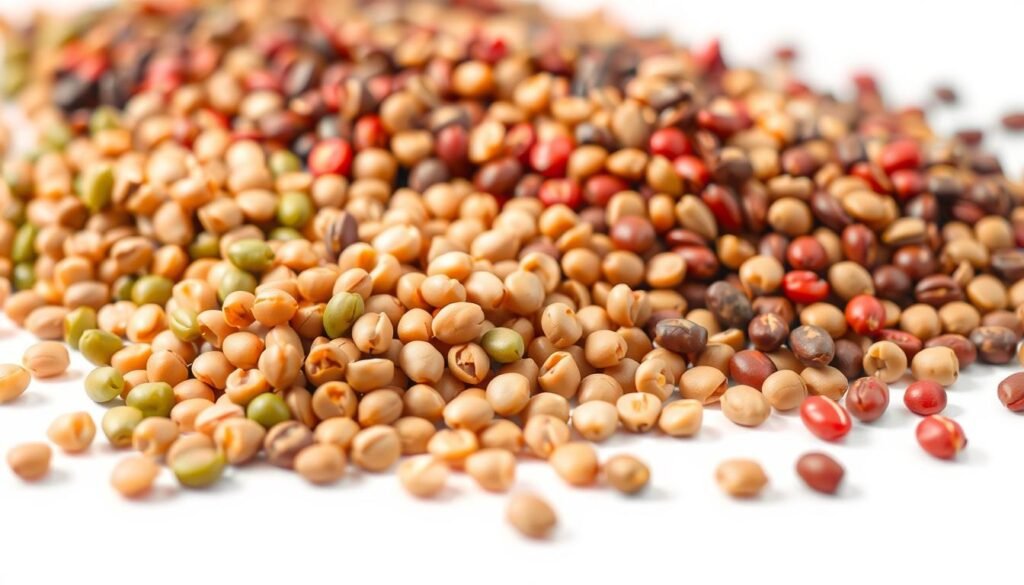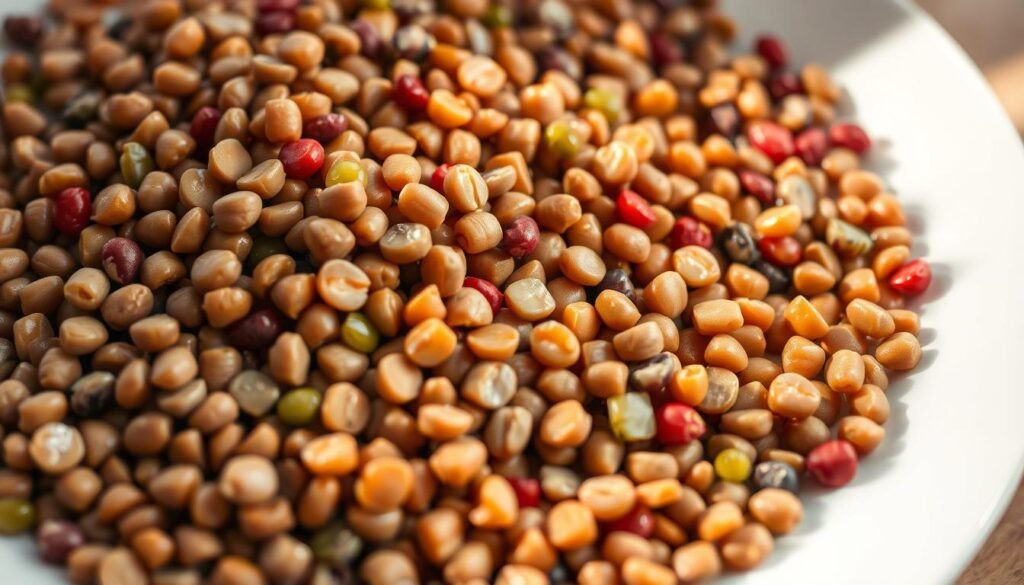Lentils, a type of legume related to beans and chickpeas, are a nutrient-rich food that plays a significant role in supporting cardiovascular health. They come in various colors and are an excellent source of dietary fiber, making them an ideal addition to a heart-healthy diet.
The high fiber content in lentils not only aids in digestion but also helps in maintaining healthy cholesterol levels, thereby supporting overall heart health. Incorporating lentils into your diet can be a simple yet effective way to enhance your cardiovascular well-being.
Key Takeaways
- Lentils are rich in fibre, supporting digestive health and healthy cholesterol levels.
- Including lentils in your diet can aid in maintaining a healthy cardiovascular system.
- Lentils are a versatile and nutrient-rich addition to a heart-healthy diet.
The Rising Concern of Heart Disease in Australia
Heart disease continues to be a leading cause of death in Australia, highlighting the need for effective prevention strategies. The impact of heart disease is not just on individuals but also on the healthcare system and the economy as a whole.
Current Statistics on Cardiovascular Disease in Australia
According to recent statistics, cardiovascular disease remains one of the major health concerns in Australia, accounting for a significant proportion of deaths annually. The Australian Institute of Health and Welfare reports that heart disease is a leading cause of hospitalization and death, emphasizing the need for preventive measures.
Dietary Approaches to Heart Health in the Australian Context
Diet plays a crucial role in heart health. Consuming a diet rich in fiber, such as lentils, can help mitigate the risk of heart disease. Lentils are not only a good source of fiber but also rich in essential nutrients like potassium and magnesium, which are vital for cardiovascular health. Incorporating lentils into one’s diet is a practical step towards reducing the risk of heart disease.
Understanding Lentils: A Nutritional Powerhouse
As a nutritional powerhouse, lentils offer a wealth of benefits that make them an excellent addition to a heart-healthy diet. Lentils are rich in macronutrients like protein and fiber, and micronutrients such as iron and potassium. They also contain antioxidants that help in reducing inflammation.
Different Types of Lentils Available in Australian Markets
Australian markets offer various types of lentils, including green, red, yellow, and beluga lentils. Each type has its unique characteristics and nutritional benefits. For instance, red lentils cook faster and are great for soups, while green lentils hold their shape well and are ideal for salads.
Comprehensive Nutritional Profile of Lentils
Lentils are a nutrient-dense food, providing a rich mix of macronutrients and micronutrients.
Macronutrients in Lentils
Lentils are an excellent source of protein and fiber, making them highly beneficial for heart health. The high fiber content in lentils supports healthy digestion and satiety.
Micronutrients and Antioxidants
Lentils are rich in essential micronutrients like iron, potassium, and folate. They also contain antioxidants that help reduce oxidative stress and inflammation.
| Nutrient | Amount per 100g | % Daily Value |
|---|---|---|
| Protein | 9g | 18% |
| Fiber | 7.9g | 32% |
| Iron | 3.9mg | 22% |
| Potassium | 731mg | 21% |
The Science Behind Lentils for Heart Health
Lentils have been increasingly recognized for their potential to support cardiovascular health. The scientific community has been studying the effects of lentils on heart health, and the results are promising.
Australian and International Research on Lentils’ Cardiovascular Benefits
Numerous studies have investigated the cardiovascular benefits of lentils. Research has shown that lentils can help lower cholesterol levels and reduce blood pressure, both of which are risk factors for heart disease. A study published in an international journal found that consuming lentils regularly can lead to a significant reduction in LDL cholesterol, a major contributor to cardiovascular disease.
The benefits of lentils are not limited to cholesterol reduction. They are also rich in potassium, magnesium, and fiber, which are essential for maintaining healthy blood pressure and overall cardiovascular function.
How Lentils Compare to Other Legumes for Heart Protection
Lentils are not the only legumes that offer heart health benefits, but they compare favorably to others in terms of nutritional content. Like other legumes, lentils are rich in protein, fiber, and various minerals. However, lentils have a higher fiber content compared to some other commonly consumed legumes, making them particularly effective at supporting heart health.
- Lentils have a higher soluble fiber content compared to chickpeas.
- They contain more potassium than many other legumes, supporting healthy blood pressure.
- Lentils are rich in antioxidants, which help protect against cardiovascular disease.

In conclusion, the science supports the inclusion of lentils in a heart-healthy diet. Their nutritional profile, coupled with the evidence from research studies, makes a strong case for lentils as a cholesterol-lowering food that supports overall cardiovascular health.
Fiber Content in Lentils: A Key to Cardiovascular Support
Lentils are rich in fiber, a nutrient that plays a significant role in maintaining cardiovascular well-being. The fiber in lentils is composed of both soluble and insoluble fiber, each contributing to heart health in distinct ways.
Soluble and Insoluble Fiber in Lentils
Lentils contain a mix of soluble and insoluble fiber. Soluble fiber forms a gel-like substance in the digestive system, which can help lower cholesterol levels. Insoluble fiber, on the other hand, aids in promoting a healthy gut microbiome by acting as a prebiotic, feeding the good bacteria in the gut.
Mechanisms of Fiber’s Protective Effect on Heart Function
The protective effects of fiber on heart health are multifaceted. Two key mechanisms include cholesterol binding properties and gut microbiome effects.
Cholesterol Binding Properties
Soluble fiber in lentils can bind to bile acids and remove them from the body, which in turn reduces the amount of cholesterol produced in the liver. This process contributes to lower LDL cholesterol levels, a significant risk factor for heart disease. According to Medical News Today, a diet rich in soluble fiber can help reduce cholesterol levels.
Gut Microbiome Effects
Insoluble fiber acts as a prebiotic, nourishing the good bacteria in the gut. A healthy gut microbiome is essential for overall cardiovascular health, as it influences inflammation, metabolic function, and even blood pressure regulation. As noted by research, a balanced gut microbiome can have a positive impact on heart health.
| Fiber Type | Function | Benefit to Heart Health |
|---|---|---|
| Soluble Fiber | Forms gel-like substance, binds to bile acids | Lowers LDL cholesterol levels |
| Insoluble Fiber | Acts as prebiotic, promotes gut health | Supports healthy gut microbiome, influences inflammation and metabolic function |
Incorporating lentils into your diet can significantly boost your fiber intake, supporting cardiovascular health through the mechanisms described above.
Lentils as Cholesterol-Lowering Foods
As a nutrient-dense food, lentils offer a promising dietary approach to managing cholesterol and enhancing cardiovascular health. The role of lentils in lowering cholesterol levels is supported by clinical evidence, highlighting their potential as a heart-healthy dietary component.
Clinical Evidence for Lentils’ Effect on LDL Cholesterol
Clinical trials have demonstrated that consuming lentils can lead to a significant reduction in LDL cholesterol levels. A study published in a reputable nutrition journal found that participants who incorporated lentils into their diet experienced a notable decrease in LDL cholesterol compared to those who did not.
The mechanism behind lentils’ cholesterol-lowering effect is attributed to their high content of soluble fiber, which binds to bile acids and removes them from the body, thereby reducing the amount of cholesterol produced in the liver.
Plant Sterols and Proteins: Their Role in Cholesterol Management
In addition to fiber, lentils contain plant sterols and proteins that contribute to their cholesterol-lowering properties. Plant sterols help block the absorption of cholesterol in the gut, while proteins may aid in improving the overall lipid profile.
The combination of these nutrients in lentils makes them an effective dietary choice for managing cholesterol levels and supporting heart health. Incorporating lentils into a balanced diet can be a valuable strategy for those looking to improve their cardiovascular well-being.
Blood Pressure Regulation Through Lentil Consumption
Rich in essential minerals, lentils are a valuable food for supporting blood pressure regulation. The mineral content in lentils, particularly potassium and magnesium, plays a crucial role in maintaining healthy blood pressure levels.
Potassium, Magnesium and Other Minerals in Lentils
Lentils are an excellent source of potassium and magnesium, minerals that are vital for cardiovascular health. Potassium helps to balance the effects of sodium in the body, while magnesium supports the relaxation of blood vessels, improving blood flow and lowering blood pressure. A diet rich in these minerals can significantly contribute to overall heart health.
- Potassium: Helps balance sodium levels and supports healthy blood vessel function.
- Magnesium: Essential for blood vessel relaxation and improved blood flow.
Impact on Hypertension Prevention and Management
Regular consumption of lentils can contribute to both the prevention and management of hypertension. The fiber in lentils, alongside their mineral content, works to support cardiovascular health by improving blood lipid profiles and aiding in the regulation of blood pressure. Studies have shown that diets rich in legumes like lentils can reduce the risk of developing high blood pressure.

By incorporating lentils into your diet, you can take a proactive step towards maintaining healthy blood pressure and supporting overall cardiovascular well-being.
Lentils for Heart Health: Direct and Indirect Benefits
Lentils are a nutritional powerhouse that offers numerous benefits for heart health, making them an excellent addition to a heart-healthy diet. As a rich source of fiber, protein, and various essential minerals, lentils contribute to cardiovascular wellbeing in multiple ways.
Anti-inflammatory Properties of Lentils
Lentils possess anti-inflammatory properties that can help mitigate the risk of heart disease. Chronic inflammation is a known risk factor for cardiovascular conditions, and consuming foods that counteract this process can be beneficial. The antioxidants and polyphenols in lentils play a crucial role in reducing inflammation.
Antioxidant Content and Cardiovascular Protection
The antioxidant content in lentils provides significant cardiovascular protection. Antioxidants help in neutralizing free radicals, which can damage heart health. By consuming lentils, individuals can enhance their antioxidant intake, supporting overall heart health.
Weight Management Benefits for Heart Health
Lentils are also beneficial for weight management, which is closely linked to heart health. Being high in fiber and protein, lentils can help individuals feel fuller for longer, reducing the likelihood of overeating and supporting a healthy weight. This, in turn, can lower the risk of developing heart-related conditions.
| Benefit | Description | Impact on Heart Health |
|---|---|---|
| Anti-inflammatory Properties | Reduces chronic inflammation | Lowers risk of heart disease |
| Antioxidant Content | Neutralizes free radicals | Protects cardiovascular health |
| Weight Management | Aids in maintaining a healthy weight | Reduces risk of heart-related conditions |
Incorporating lentils into your diet can be a simple yet effective way to support heart health. With their rich nutritional profile and multiple benefits, lentils are an ideal food for those looking to improve their cardiovascular wellbeing.
Incorporating Lentils into Your Australian Diet
Lentils offer a versatile and nutritious way to support cardiovascular health in the Australian context. With their high fiber content and rich nutritional profile, lentils can be a valuable addition to a heart-healthy diet.
Australian-Inspired Lentil Dishes
Australian cuisine can easily incorporate lentils into traditional dishes. For example, lentil soup with a bush tomato twist or lentil salads with grilled Australian lamb are delicious and nutritious options. Lentils for heart health are a great way to start a meal that’s both filling and beneficial for your cardiovascular system.
Mediterranean-Australian Fusion Recipes with Lentils
Fusing Mediterranean recipes with Australian ingredients can create exciting lentil-based dishes. Consider a lentil and feta salad with grilled Australian shrimp or a lentil stew with lamb and Mediterranean spices. These dishes not only taste great but also provide a good amount of fiber in lentils.
Meal Planning for Regular Lentil Consumption
To reap the benefits of lentils, it’s essential to incorporate them regularly into your diet. Here are some tips for meal planning:
Weekly Meal Prep Ideas
- Prepare a big batch of lentil soup on the weekend and use it for lunches throughout the week.
- Add lentils to your favorite curry or stew recipe for an extra nutritional boost.
Lentil-Based Lunch Options
- Lentil salad with mixed greens and a citrus vinaigrette.
- Lentil wraps with avocado and tomato.
By incorporating lentils into your meal planning, you can enjoy the benefits of lentils for heart health while exploring a variety of delicious recipes.
Cooking Methods that Maximise Lentils’ Nutritional Value
Cooking lentils correctly is key to retaining their nutritional value, especially their fiber content, which is crucial for heart health. Proper cooking techniques can help preserve the delicate nutrients in lentils.
Optimal Preparation and Cooking Techniques
To maximize the nutritional benefits of lentils, it’s essential to prepare and cook them correctly. Here are some tips:
- Rinse lentils thoroughly before cooking to remove any debris or impurities.
- Soak lentils for 30 minutes to an hour to reduce cooking time and improve digestibility.
- Cook lentils until they’re tender, but avoid overcooking, which can lead to a loss of nutrients.
Using these techniques can help retain the fiber in lentils, supporting heart health.
Common Cooking Mistakes to Avoid
When cooking lentils, there are several common mistakes to avoid:
- Overcooking, which can result in a mushy texture and loss of nutrients.
- Not rinsing lentils before cooking, potentially leaving behind impurities.
- Not adjusting cooking liquid, which can lead to undercooked or overcooked lentils.
By avoiding these mistakes, you can ensure that your lentils are not only delicious but also packed with nutrients, supporting overall health and particularly lentils for heart health.
Potential Considerations When Adding Lentils to Your Diet
As you start to include lentils in your diet, it’s essential to be mindful of a few key factors. While lentils are generally considered a healthy addition to a heart-healthy diet, some individuals may experience certain effects.
Digestive Adjustment Period and Solutions
Some people may encounter digestive issues when they first start consuming lentils, such as bloating or gas. To minimize these effects, it’s recommended to start with small portions and gradually increase the amount. Additionally, rinsing lentils before cooking and soaking them overnight can help reduce the likelihood of digestive discomfort.
Interactions with Medications and Specific Health Conditions
Lentils may interact with certain medications or exacerbate specific health conditions. For instance, individuals on blood thinners should be aware of the potential interaction with lentils, which are rich in vitamin K. It’s also important for people with certain health conditions, such as kidney disease, to consult with their healthcare provider about incorporating lentils into their diet.
Comparing Lentils with Other Heart-Healthy Australian Foods
Lentils are often considered a superfood for heart health, but how do they stack up against other heart-healthy options available in Australia? Lentils are rich in fiber, protein, and various minerals that support cardiovascular health.
Lentils vs. Other Plant-Based Protein Sources
When comparing lentils to other plant-based protein sources like chickpeas and beans, lentils stand out due to their high fiber content and versatility in cooking. They are particularly effective as cholesterol lowering foods, making them an excellent choice for heart health.
Complementary Foods for a Complete Heart-Healthy Diet
A heart-healthy diet isn’t just about one food; it’s about variety. Lentils can be complemented with other Australian foods like leafy greens, nuts, and whole grains. Together, they provide a comprehensive nutritional profile that supports heart health.
Cost-Effectiveness of Lentils in the Australian Market
Lentils are not only nutritious but also cost-effective. Compared to other protein sources, lentils are relatively inexpensive, making them accessible to a wide range of consumers. Here’s a comparison table:
| Food Item | Average Price (AUD/kg) | Nutritional Value (per 100g) |
|---|---|---|
| Lentils | $2.50 | High in fiber and protein |
| Chickpeas | $3.00 | High in protein and fiber |
| Salmon Fillets | $15.00 | Rich in omega-3 fatty acids |
Incorporating lentils into your diet can be both beneficial for heart health and budget-friendly. With their high fiber in lentils content, they are a valuable addition to a heart-healthy diet.
Conclusion: Making Lentils a Heart-Healthy Staple in Your Australian Diet
Incorporating lentils into your diet can have a significant impact on heart health. As a rich source of fiber, lentils support cardiovascular function and can be a valuable addition to a balanced diet. The fiber in lentils plays a crucial role in lowering cholesterol levels, making them an effective cholesterol lowering food.
Australians can benefit from adding lentils to their meals, given the rising concern of heart disease in the country. With their versatility, nutritional value, and cost-effectiveness, lentils are an ideal ingredient for heart-healthy cooking. By making lentils a staple in your diet, you can take a proactive approach to supporting your cardiovascular health.
With the numerous benefits of lentils for heart health, it’s clear that they should be a regular feature in Australian diets. By incorporating lentils into your meal planning, you can enjoy a delicious and nutritious way to support your overall well-being.





